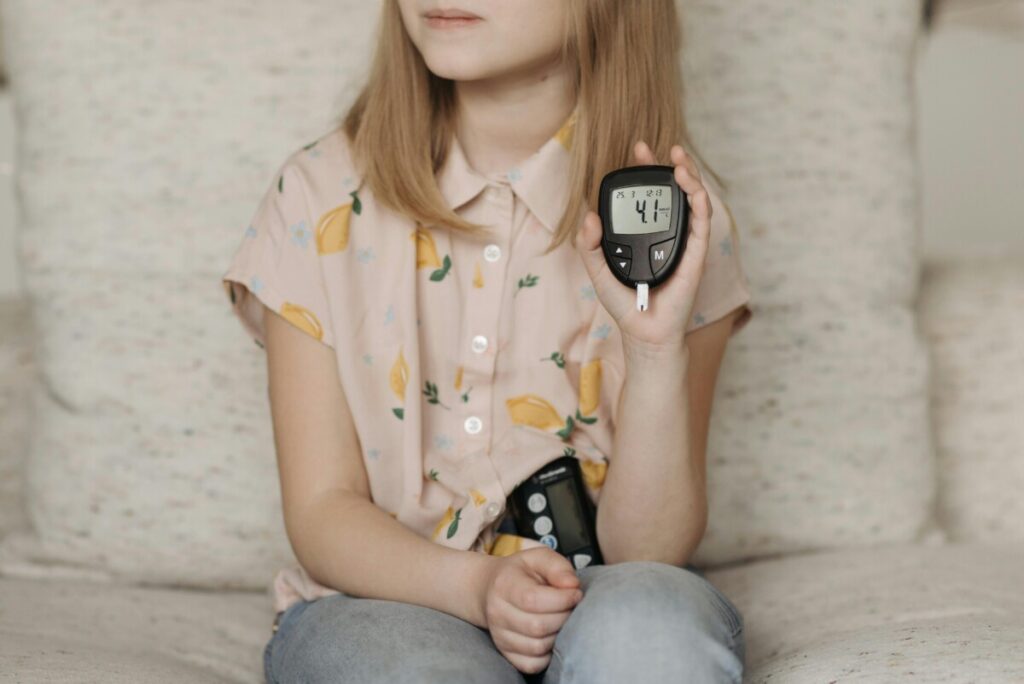Type 1 Diabetes in Children: Parenting and Care Tips

Parenting a child with Type 1 Diabetes can be a challenging and overwhelming experience. However, with proper education, support, and management techniques, you can create a safe and healthy environment for your child. This blog post aims to provide parenting and care tips for children with Type 1 Diabetes.
Pediatric Diabetes Care
Type 1 Diabetes management in kids requires a comprehensive approach. It is essential to work closely with your child’s pediatrician and diabetes care team to develop a personalized care plan. This plan should include insulin administration, blood sugar monitoring, and dietary considerations.
Regular pediatric diabetes care appointments are crucial for monitoring your child’s overall health and adjusting their treatment plan as they grow. These appointments also provide an opportunity for education and support for both you and your child.
Remember to involve your child in their care as much as possible. This will help them develop a sense of responsibility and ownership over their diabetes management.
Insulin Administration for Children
Administering insulin to children with Type 1 Diabetes requires patience, precision, and proper techniques.
Here are some tips for successful insulin administration:
Use age-appropriate insulin delivery devices, such as insulin pens or pumps.
Ensure proper needle insertion technique to minimize pain or discomfort.
Involve your child in the process by teaching them about insulin administration and allowing them to practice under supervision.
Create a consistent routine for insulin administration to establish a sense of stability and predictability.
Remember to always follow your healthcare provider’s instructions and consult them if you have any concerns or questions regarding insulin administration.
Blood Sugar Monitoring in Diabetic Children

Frequent blood sugar monitoring is a crucial aspect of managing Type 1 Diabetes in children. It allows you to track your child’s blood sugar levels and make informed decisions about insulin dosages and dietary adjustments.
Use a reliable blood glucose meter to monitor your child’s blood sugar levels regularly. Work with your child’s diabetes care team to establish target ranges for blood sugar levels and understand when intervention or adjustments are necessary.
Teach your child how to perform blood sugar checks and involve them in the process. Make it a positive and educational experience, emphasizing the importance of monitoring and how it helps them stay healthy.
Kid-Friendly Diabetes Education
Providing age-appropriate diabetes education to your child is essential for their long-term well-being. Teach them about the basics of diabetes, such as what it is, how it affects their body, and why they need insulin.
Use visual aids, books, and online resources specifically designed for children with diabetes to make the learning process engaging and enjoyable. Encourage your child to ask questions, express their concerns, and actively participate in their diabetes education.
Additionally, involve your child’s school in their diabetes education. Work with teachers and school staff to ensure they understand your child’s needs and can provide appropriate support during school hours.
Childhood Diabetes Support

Managing Type 1 Diabetes in children requires a strong support system. Seek out local support groups or connect with other parents of children with diabetes. Sharing experiences, tips, and challenges can provide emotional support and practical advice.
Utilize online resources and social media platforms to connect with the diabetes community. There are numerous online forums, blogs, and social media groups dedicated to parents of children with diabetes.
Remember, you are not alone in this journey. Reach out for support and share your experiences with others who understand the unique challenges of parenting a child with Type 1 Diabetes.
Balancing Diabetes and Childhood Activities
Having Type 1 Diabetes should not limit your child’s participation in various childhood activities. With proper planning and precautions, your child can enjoy sports, play dates, sleepovers, and other social events.
Communicate with other parents, teachers, and coaches about your child’s diabetes management plan. Educate them about the signs and symptoms of low blood sugar and how to respond in case of an emergency.
Always ensure your child has quick access to snacks or glucose tablets to treat low blood sugar episodes during activities. Encourage them to wear a medical alert bracelet or necklace to alert others about their condition.
School Life with Type 1 Diabetes
Managing Type 1 Diabetes during school hours requires collaboration between parents, school staff, and healthcare providers.
Here are some tips to ensure a smooth experience:
Develop a comprehensive diabetes management plan in collaboration with your child’s healthcare team.
Provide the school with necessary supplies, such as insulin, blood glucose meters, snacks, and glucagon kits.
Train school staff on diabetes management and emergency procedures.
Establish open communication with teachers and school administrators to address any concerns or adjustments needed.
Regularly check in with your child’s school to ensure their diabetes management plan is being followed and make any necessary updates or adjustments as needed.
Parental Role in Diabetes Care
As a parent, your role in your child’s diabetes care is crucial. You need to be their advocate, educator, and source of support.
Here are some key aspects of your parental role:
Ensure your child’s care plan is followed consistently.
Educate yourself about Type 1 Diabetes and stay up to date on the latest research and treatment options.
Promote healthy eating habits and a balanced lifestyle for your child.
Encourage regular physical activity and help your child find activities they enjoy.
Monitor your child’s emotional well-being and provide emotional support when needed.
Remember to take care of yourself as well. Parenting a child with Type 1 Diabetes can be emotionally and physically challenging. Seek support from friends, family, or professional counselors to ensure your own well-being.
Child-Friendly Diabetes Devices

Advancements in technology have brought about child-friendly diabetes devices that make diabetes management easier and more convenient. Insulin pumps, continuous glucose monitors (CGMs), and automated insulin delivery systems are some examples of these devices.
Consult with your child’s healthcare team to explore the available options and determine which devices are suitable for your child’s needs. Ensure proper education and training on device usage for both you and your child. Remember that these devices are tools to assist in diabetes management, but they should not replace regular blood sugar monitoring and close communication with healthcare professionals.
Conclusion
Parenting a child with Type 1 Diabetes requires dedication, education, and support. By following these parenting and care tips, you can create a nurturing environment where your child can thrive while managing their diabetes. Remember, you are not alone in this journey, and there are numerous resources and support networks available to assist you along the way.
https://holisticwellnesswave.com/index.php/2024/03/28/uncovering-the-dangers-ultra-processed-foods-and-your-health/
https://www.ncbi.nlm.nih.gov/
https://diabetes.org/
FAQs
Q: What are the symptoms of type 1 diabetes in children?
A: Common symptoms of type 1 diabetes in children include excessive thirst, frequent urination, sudden weight loss, extreme fatigue, and blurred vision.
Q: How is type 1 diabetes in children diagnosed?
A: Type 1 diabetes in children is diagnosed through blood tests that measure blood glucose levels and detect the presence of antibodies that attack insulin-producing cells in the pancreas.
Q: How is type 1 diabetes treated in children?
A: Type 1 diabetes in children is typically treated with insulin injections or an insulin pump to help regulate blood sugar levels.
Q: What causes type 1 diabetes in children?
A: Type 1 diabetes in children is caused by an autoimmune reaction in which the body’s immune system attacks and destroys the insulin-producing cells in the pancreas.
Q: Can type 1 diabetes in children be prevented?
A: Currently, there is no known way to prevent type 1 diabetes in children as the exact cause of the condition is still unknown.
Q: How can children with type 1 diabetes manage their condition?
A: Children with type 1 diabetes can manage their condition by monitoring their blood sugar levels regularly, following a healthy diet, exercising, and taking insulin as prescribed by their healthcare provider.
Q: What are the signs and symptoms of type 1 diabetes in children?
A: Signs and symptoms of type 1 diabetes in children may include increased thirst, frequent urination, sudden weight loss, extreme hunger, and irritability or mood changes.







